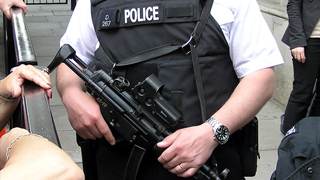Tim Dieppe: Home-grown terrorist threat
- |

A 1000-page report was released this week highlighting the continuing threat from 'home-grown' terrorists, alongside news that security services have prevented 13 potential terror attacks since June 2013.
Tim Dieppe comments on this news, saying it demonstrates that "we have been wrong to see Islam as a benign religion that poses no security threat to our nation...I very much hope that it does not take a successful terrorist attack to provoke the government to take serious action."
A 1,000-page report released by the Henry Jackson Society this week, highlights the continuing threat from home-grown terrorists. The report is a study of Islamism-inspired terrorism convictions and suicide attacks between 1998 and 2015. The report concludes that: "the majority of the Islamism-inspired threat to the UK remains from 'home-grown' terrorism."
13 plots prevented
This comes as it was also revealed this week, that the security services have prevented 13 potential terror attacks since June 2013. Assistant Commissioner Mark Rowley said that there were 500 live counter-terror investigations at any time. The head of MI6 said in December that the scale of the terrorism threat to the UK is "unprecedented."
The threat level for international terrorism in the UK has been severe – meaning an attack is highly likely - since August 2014. Back in 2015, it was revealed that MI5 and anti-terrorism police are monitoring more than 3,000 homegrown Islamist extremists willing to carry out attacks in Britain.
Link with segregation
The report shows a clear link between segregated Muslim areas and terrorism. Only 14% of British Muslims live in neighbourhoods that are more than 60% Muslim, yet 24% of all Islamist terrorists come from these areas.
Just five council wards in Birmingham (out of 9,500 in Britain as a whole) account for 26 convicted terrorists, a tenth of the national total. Birmingham overall had 39 convicted terrorists. London was home to 117 terrorists, though they are more widely spread and roughly proportional to the Islamic community in London.
Minority of lone operators
The report notes that: "Only one in ten offences was carried out by someone who acted entirely alone and had no extremist connections." The internet increasing as a source for engagement with extremism, and was influential in over half of more recent cases.
It states: "There is little correlation between involvement in terrorism and educational achievement and employment status, and the majority of offences were committed by those living with their partner and/or children, or increasingly, at their family home."
Becoming harder to identify
Offenders are "increasingly less likely to be known to the Security Service," which along with the "increased prevalence of smaller cells and individualistic offending" means that fewer opportunities for identification are arising. At the same time, terror convictions have doubled in the past five years.
The report states that: "Religious converts were disproportionately involved in Islamism-inspired terrorism."
Conclusions
This report highlights the difficulties faced by the security services in combatting the increasing threat from home-grown terrorism. It shows that tackling segregation is urgently required as one way of mitigating the problem. It demonstrates that we have been wrong to see Islam as a benign religion that poses no security threat to our nation. The Casey Review highlighted the problematic extent of segregation in our nation, and I proposed ten policies that the government could easily take up that would make a real difference.
The security services have done a remarkable job in preventing potential Islamist terrorist attacks in recent years. I very much hope that it does not take a successful terrorist attack to provoke the government to take serious action to tackle this threat.
Related Links:
Islamist Terrorism: Analysis of Offences and Attacks in the UK (1998-2015) (Henry Jackson Society)
Report: Homegrown Terrorism is Top Threat to UK (Gatestone Institute)
Half of Britain's jihadists are now radicalised online (Mail)
Solutions for a segregated society: The Casey review and what to do about it
Security services 'prevented 13 UK terror attacks since 2013' (BBC)
Terrorism most immediate threat to UK, says MI6 (BBC)
Revealed: terror map of UK (Times £)
Terror map reveals danger of segregation (Times £)
3,000 terror suspects plotting to attack UK (Times £)
